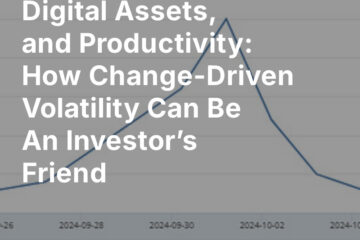In January, 2009, bitcoin’s founder, known only by the pseudonym “Satoshi Nakamoto,” launched the cryptocurrency era by mining the first bitcoin block. Since then it has been a wild ride for bitcoin users, enthusiasts, speculators, and traders, with digital assets ranking as among the most volatile financial assets in history.
One of the key causes of this volatility has been the fear and uncertainty surrounding the response of regulators to digital assets. The early bitcoin community was largely made up of libertarians who hoped that digital currencies would be an unstoppable force for economic freedom; in our analyses of bitcoin last summer, we characterized this as an impulse to create “anarchist money.” Bitcoin first rose to real-economy prominence when it became the preferred medium of exchange on the infamous Silk Road website, where it was used to procure a variety of semi-legal and illegal goods and services.
With such an origin, and such a history, bitcoin inevitably provoked fear among many regulators, who are legitimately concerned about ensuring fair dealing and transparency in the global financial system — as well as about curtailing financial networks and structures that can be used in the service of crime.
However, a visionary few digital asset enthusiasts from the beginning saw that bitcoin and the innovation it helped to incubate could be powerfully disruptive and transformative — not just ways for criminals to move and hide cash and buy contraband. They saw that the key would be intelligent regulation, rather than the creation of an anarchic “crypto space” completely separate from the regulated financial system.
Much of the volatility that has characterized digital assets since 2009 has revolved around this basic divergence. What would digital assets be — tools for crime, or tools for innovation in financial tech and beyond? And how would regulators respond to them — would they see only the threat, and try to crush it, or would they see the promise, and try to nurture it?
Recent volatility in digital assets has been directly or indirectly entirely linked to regulatory concerns.
Last year, the evolving regulatory stances of China and South Korea caused frantic crypto gyrations. (China seems to be creating a genuinely hostile regulatory environment for cryptos, while South Korea is cautious and tightening regulations, but not as hostile as initial reports suggested.) Vietnam and Russia are also crafting highly restrictive cryptocurrency regulations.
A middle path is being followed by much of the developed world — including the U.S., the EU, Canada, Australia, and Singapore. Recent Congressional hearings in the U.S. cheered digital asset enthusiasts, with regulators from the Securities and Exchange Commission (SEC) and Commodities Futures Trading Commission (CFTC) making positive comments about not wanting to impose overly stringent regulations that would choke off technological innovation in finance. It was this event that brought bitcoin off its recent lows.
Japan is another jurisdiction that is charting a regulatory course that is relatively friendly and welcoming to digital asset firms. However, Japan has been the location of some of cryptocurrencies’ biggest heists — the 2014 hack of the Mt. Gox cryptocurrency exchange, which led to a bitcoin decline from which the market took years to recover; and the theft at the end of January of half a billion dollars’ worth of NEO tokens from Tokyo exchange Coincheck. These events have not helped Japan’s ambitions to become a global cryptocurrency hub.
Other more crypto-friendly jurisdictions — Hong Kong, for example — have shadows hanging over them. As one crypto entrepreneur noted, “You can have all the armored walls in the world, but if your vault is in China or Singapore and the government says, ‘I’m seizing your assets,’ there’s nothing you can do.”
However, there is one country, and one town in particular within that country, that have rolled out the red carpet for digital asset and blockchain-related startups, and also have a top-notch reputation for privacy and security in financial matters — Switzerland, and specifically the town of Zug. A lot of the future of digital assets depends on whether or not global regulators eventually cotton on to Zug’s welcoming regulatory model.
Switzerland and the Rise of “Crypto Valley”
Switzerland as a country, of course, has a long history as a carefully regulated, secure, and reliably private financial hub. In recent years, Swiss regulators have dialed back some of the country’s traditional respect for financial secrecy under the changing realities of international crime, terrorism, and money laundering. Nevertheless the country has an unalloyed reputation for both respect for liberty and the rule of law. It also has fiercely independent local jurisdictions, which compete with one another in crafting tax and governance structures to attract foreign businesses and investors. While many countries have been hesitant to expose investors to crypto risk, one Swiss official said, “Our consumers should have the freedom to invest in exotic instruments, even gamble.”
Switzerland’s Zug Looks Picturesque and Medieval — But Its Embrace of Digital Assets Is Fully Space-Age
Source: Zug Tourismus
The town of Zug is not one of Switzerland’s more powerful and established commercial and financial centers, such as Zürich, Geneva, or Basel (it does not even rank in the top 20 Swiss cities and towns by size). Its history is humble, with its economy long based primarily on dairy products from cows pastured in the canton’s high pastures. It began to attract manufacturing during the 20th century. In recent years, Zug has been particularly aggressive in attracting digital-asset firms to base themselves there — for example, allowing them to incorporate on the basis of digital asset wealth rather than insisting that it be cashed out into fiat currency. Taxes are also competitive compared to other jurisdictions in Switzerland. The region is now known colloquially as “Crypto Valley.”
The town’s mayor has gone all-out to attract digital currency entrepreneurs. He recently commented, with marvelous understatement: “Curiosity and being open to the world have brought us much wealth in the past” (a statement that could serve as a summary of their faith for believers in the power of economic freedom).
The Ethereum Foundation arrived in Zug in 2013, beginning a mass influx of similar arrivals. The city has pioneered the use the Ethereum blockchain to create a secure digital identity for citizens to allow them to access municipal services via their smartphones — and will soon conduct tests of a blockchain-secured voting system for municipal offices.
Switzerland’s national regulator is also keen to maintain the country’s status as headquarters for global “initial coin offerings” — more than $550 million was raised in Swiss ICOs in 2017. (With the term “ICO” falling under a cloud, some digital asset proponents prefer to call them “token creation events.”) The State Secretary For International Financial Matters, Jörg Gasser, has commented: “We think there is huge potential… We want [the ICO market] to prosper but without compromising standards or integrity of our financial markets.”
ICOs are of particular importance because they have the potential to disrupt the venture capital industry, disintermediating big investment banks, reducing the cost of fundraising for firms, and democratizing the process of investing in a start-up by making it accessible to anyone with a smartphone.
Digital asset entrepreneurs’ enthusiasm for Switzerland is also derived in part from their sense, as one commented, that “Swiss regulators are the only ones who really understand the technology.”
Investment implications: For digital assets to fulfill their potential, the world’s financial regulators need to find a “sweet spot” where regulation is stringent enough to root out criminality, manipulation, and fraud, but permissive enough to let innovation flourish, even when it is contrary to the interests of the current leadership of financial firms whose dominance will be threatened by digital asset innovations such as ICOs. Switzerland is forging ahead in this regard, and the country’s willingness to embrace critical financial innovations may help cement their status as a preferred financial destination in a blockchain-disrupted future. If and as more jurisdictions follow Switzerland’s lead, it will bode well for digital assets in general.




